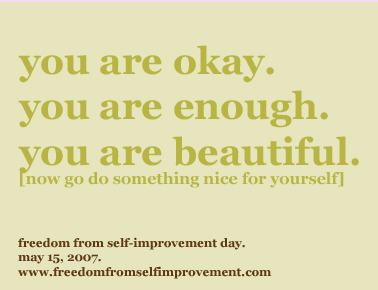I’ve been thinking a lot about transgressions lately. Injury and violation can come directly to you in many forms both tangible and undeniable – everything from the mashed foot to the bruised arm to the black eye – and subjective and dismissible – hurt feelings, shame from public humiliation, recriminations for having trusted and found that trust misplaced.
Injuries, too, can come in the form of suffering brought on by actions directed at or taken out on someone you care about; the parents of a murder victim, while still alive, suffer greatly and have genuinely been injured as a result of their child’s death.
The subjective injures just as surely as the tangible. Many a thinker propounds the view that you are as you feel (or think (and the universe save me from readers of The Secret)) so if you feel injured, put upon, used, abused, or betrayed unless your expectations of your own greatness and entitlement are completely out of whack mostly likely you have been done wrong. And very often it took you by surprise. Or, more likely, you knew it was coming but you just didn’t want to acknowledge it; the “pretend it isn’t there and it’ll go away” school of coping that causes so many women of a certain age to say things like “cancer” and “gay” in that stage whispery tone that attracts more attention than it deflects.
And we remember these things, these injuries and betrayals. We hang on to them against all reason and purpose, and often long after, most likely, the person who did us injury has long forgotten not only about doing the injury but about us at all. A lot of times we hold on to these lists of grievances like treasures, taking them out of our figurative pocket and looking at the much creased paper on which they are written in a vain attempt to figure out why these injurious actions, which have not changed, were committed against us in the first place. What is it about us that made this person do that thing? Are we deficient in some way? Did we do something we shouldn’t have? Fail to do something we should? Did we bring this on ourselves? Why us? The litany of questions goes on and on but this is the one at its base: why us? What we fail to realize is that much of the time these injuries, these abuses, have absolutely nothing to do with us personally.
Many times an action that cuts you to the quick, one that slices flesh away from bone, that bruises in a way that lasts, physically or emotionally, happens simply because you were in the way of the actor.
I could not guess at what percentage, high 90s perhaps, of the interpersonal physical violence that occurs on our little blue marble happens simply because someone with more power, daring, or rage decides he wants what you have. The thing of it is that in his scenario You don’t really exist. You are not Jane or Emma or Bob; you are fulfilling a role. That role is prey. Victim. Hapless innocent in the wrong place at the wrong time paying not enough attention to the sweaty guy in the corner and hey maybe isn’t it a little hot in July for a hooded sweat shirt and long pants? Mr. Sweaty Predator Guy doesn’t give a flying shit that you had a bad day, or your car is broken down, or that your toddler smiled and said her first word today. He doesn’t know anything about you as You. He sees you, much of the time, as “you as someone possessing what I want.”
In much the same way that the mugger, car thief, or rapist doesn’t see you as You neither does the asshat who rams your knee with his briefcase and doesn’t even look back to apologize. Your humanity doesn’t exist for him because he is so totally focused on his own needs, his own wants, and his own world that you just aren’t there.
Emotional transgressions are no different. Someone does something, makes a decision, refuses to make a decision, says something, reveals a secret not through malice but because it serves some internal need and, most likely, this person never even gave a thought to what effect it would have on you. She’s met her need and moves on often not even looking back to see you standing there, shattered, your dignity and self confidence in shreds.
And even though you hurt, even though you feel dead and dry and cynical and like you’ll never trust anyone, least of all yourself, again the reality is that same percentage applies; that much of the time the effects of someone’s actions are secondary to getting their own needs met and that it could have been anyone standing on the X on which you now find yourself.
What makes a difference in those subjective, dismissible, emotionally interpretable situations is not the other person’s actions, intent, nor, as I used to believe, even the effects of those actions. No, what makes the difference in those situations is your investment. As Eleanor Roosevelt famously said, “No one can make you feel inferior without your consent.”
What is most difficult to reconcile is the other single digit percentage of the times when someone has done you wrong; those times when you’ve told someone exactly what it would do to you if they pursued a certain course of action and they go ahead and do it any way. Can you blame someone for putting her own interests before yours? Most certainly not. Enlightened self-interest is the key to survival.
That doesn’t mean you have to like it, though.
So the next time someone says “It’s not about you. It’s about me.” best believe them. Because no, it isn’t about you. Most of the time even when it appears to be about you it really is all about them.
